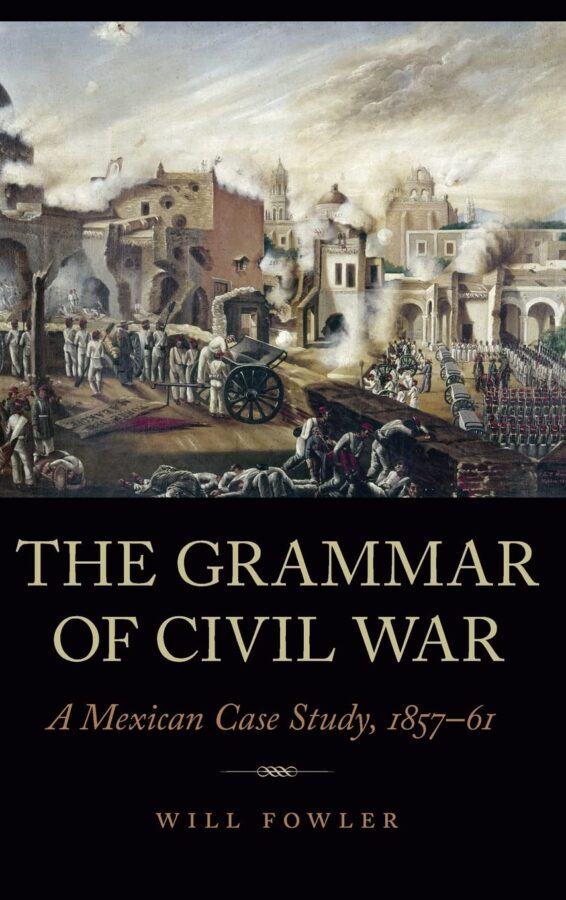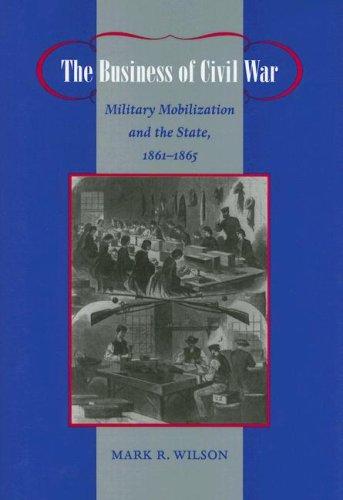The Grammar of Civil War: A Mexican Case Study, 1857-61 by Will Fowler. University of Nebraska Press, 2022. Cloth, ISBN: 978-1496230461. $65.00.
 Will Fowler, currently professor of Latin American studies at the University of St. Andrews, is a highly accomplished scholar of nineteenth century Mexico. His Santa Anna of Mexico offers a revisionist account of the dictator that many people still love to hate. His website, “The Pronunciamiento in Independent Mexico, 1821-1876,” contains hundreds of transcribed pronunciamientos (written protests/petitions), an invaluable set of sources for scholars. He has edited three volumes about pronunciamientos and authored a fourth. He has co-authored additional volumes in English and Spanish.
Will Fowler, currently professor of Latin American studies at the University of St. Andrews, is a highly accomplished scholar of nineteenth century Mexico. His Santa Anna of Mexico offers a revisionist account of the dictator that many people still love to hate. His website, “The Pronunciamiento in Independent Mexico, 1821-1876,” contains hundreds of transcribed pronunciamientos (written protests/petitions), an invaluable set of sources for scholars. He has edited three volumes about pronunciamientos and authored a fourth. He has co-authored additional volumes in English and Spanish.
The point of this recital of Fowler’s credentials is to note that he is well-known among scholars of Mexico, but probably not so familiar to readers of The Civil War Monitor. However, readers of this periodical should make a place on their bookshelves for The Grammar of Civil War. This volume examines “the worst civil war that took place in nineteenth-century Mexico” (xi), the Mexican Civil War of 1857-1861, sometimes called the War of Reform or the Three Years’ War. Readers will benefit from Fowler’s discussion of another civil war that occurred in the Americas: one that ended shortly before the U.S. Civil War began. However, The Grammar of Civil War also hunts for larger game in the sense that Fowler uses Mexico as a case study to think about why civil wars happen and, when they do, what makes them so violent. Simply stated, his deep analysis of the Mexican Civil War of 1857-1861 allows him to create a grammar of civil war—that is to say, a framework to help readers understand the origins, process, and outcomes of civil war.
Defining what a civil war is might seem straightforward, but, as many scholars can attest, it is not such an easy enterprise. Fowler notes some of the problems of trying to find a one-size-fits-all definition, but he offers the following summary: “a war taking place primarily within one nation-state, pitting at least two politically defined sides against each other, one of which is the government at the beginning of the hostilities, and resulting in major military clashes with high death tolls on the part of all those involved, impacting upon the civilian population” (13-14). This understanding of civil wars, Fowler contends, allows him to “discern a number of elementary principles governing the way a civil war will start, unfold, and end” (14), which he outlines in the grammar. Fowler concedes that there will be exceptions and variation from conflict to conflict, and he encourages other scholars to analyze how the grammar works for the wars that interest them. Fowler outlines the grammar in three separate tables: Origin (15-16), Process (28), and Outcome (38). He also includes one large table (214-216) for readers who would like to see the whole grammar in one place.
Chapter two offers a detailed overview of Fowler’s case study to help readers who do not have much knowledge about Mexican history. Scholars have not determined an exact death toll in this conflict, but it could be as high as 200,000 people out of a population of eight million. The war began on December 17, 1857, when General Félix Zuloaga’s troops marched into Mexico City, closed down the Congress, took over the National Palace, locked up politicians, and issued the Plan de Tacubaya, a pronunciamiento that “declared the 1857 Constitution was cancelled and called upon constitutionally elected President Ignacio Comonfort to remain in post while arrangements were made to summon a new constituent congress” (43). Civil war quickly spread across Mexico, and Fowler deftly illustrates how the fortunes of both sides ebbed and flowed. Eventually, the Liberals gained the upper hand, although their victory was short-lived. Mexico faced another brutal and protracted conflict in 1862-1867.
Chapters three, four, and five analyze how the grammar works for Mexico. There are so many components to the grammar that it would be impossible to examine them all in this short review. Thus, readers are encouraged to consult Fowler’s tables and consider all the elements he discusses. Chapter three examines the war’s origins, specifically, “the key areas of the grammar of civil war that determine how one begins” (89).
Chapter four discusses the war’s process, which “helps us explain why people who were once peaceful can end up taking up arms to fight their fellow citizens, as well as how the fighting itself will develop its own dynamics and logic, resulting in its defining nightmarish characteristics and almost inevitable perpetuation if neither side can gain the upper hand” (131).
Chapter five investigates the war’s outcome, with particular focus on “how and why the war ends the way it does, and what its legacy will be for subsequent generations, depending on how its memory is addressed by the governments that emerge in its aftermath” (178).
Ultimately, Fowler does not believe that the grammar he developed will help prevent future civil wars from taking place, but he does hope it will provide scholars with analytical tools “with which to interpret past and present civil wars, offering an explanation of the set of elements that, both in theory and in practice, will need to be in place for one to start and end, and that explain how and why the idiosyncratic nature and logic of civil war’s very own particular internecine form of violence will determine of itself how we may expect the war to unfold” (228).
Provocative books often leave readers with additional questions. One that may be worth some thought has to do with reconstructions. In general, Fowler is more concerned in this book with civil wars than with reconstructions. Thus, after creating a lengthy and detailed grammar of civil wars, reconstructions almost seem like an afterthought. One wonders whether it would be possible, or useful, to attempt to create a grammar of reconstruction and, if so, what one might look like.
The Grammar of Civil War, a deeply researched and well-written discussion of the Mexican Civil War of 1857-1861, uses that war as a case study to create a framework that scholars can apply to other conflicts to reach broader conclusions about the origins, processes, and outcomes of civil wars. Anyone interested in civil wars throughout world history should read the book and think carefully about the elements in Fowler’s grammar.
Evan C. Rothera is Assistant Professor of History at the University of Arkansas—Fort Smith. He is the author of Civil Wars and Reconstructions in the Americas, which was a finalist for the William E. Colby Military Writers’ Award.
